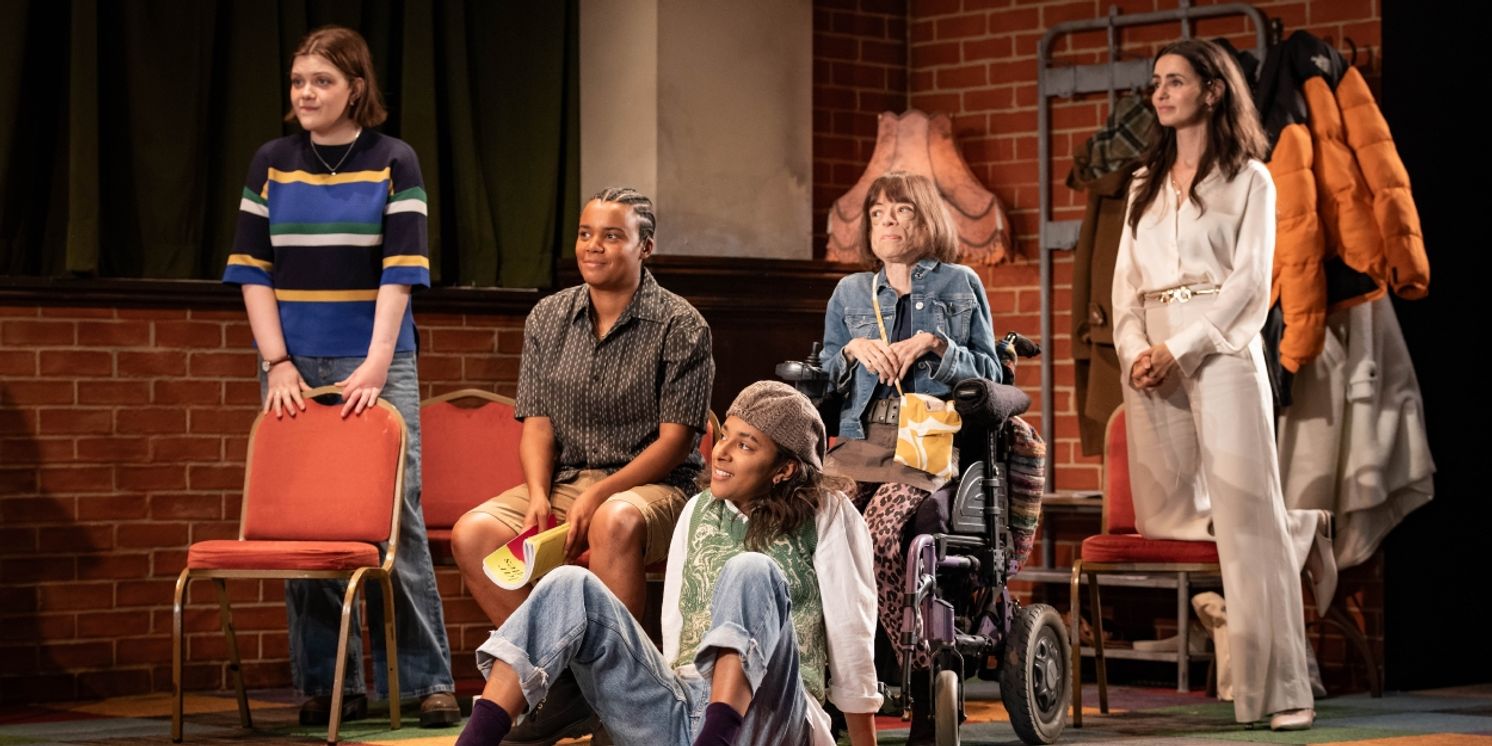Review: THE MINISTRY OF LESBIAN AFFAIRS, Kiln Theatre
Come for the comedy, stay for the drama

![]() Iman Qureshi’s The Ministry of Lesbian Affairs, directed by Hannah Hauer‑King, begins like a buoyant sitcom, only to pivot—sometimes too sharply—into earnest, confessional drama. At its best, it sparkles with wit and warmth; at its most uneven, it feels like two distinct shows blocking one another.
Iman Qureshi’s The Ministry of Lesbian Affairs, directed by Hannah Hauer‑King, begins like a buoyant sitcom, only to pivot—sometimes too sharply—into earnest, confessional drama. At its best, it sparkles with wit and warmth; at its most uneven, it feels like two distinct shows blocking one another.
Fresh off the transfer train from Soho Theatre, The Ministry of Lesbian Affairs is a musical comedy treat. Set in a shabby rehearsal room, the play follows a newly formed choir of lesbians (and one bisexual) aiming to secure a coveted spot on the main stage at Pride. Under the stewardship of stalwart leader “OWL” (Older Wiser Lesbian) Connie, a motley crew of voices coalesces—broadband engineer Lori and her tentatively out partner Ana, lothario Ellie, Qatari newcomer Dina, feminist firebrand Fi, academic Bridget, and others. Collective goals give way to personal revelations, and the mission fractures when controversy erupts around exclusion and “transphobia” within the group..
The first act is a crisp comedy treasure chest. With broad physical humour, sharp one-liners, and a rehearsal-room camaraderie, the tone is uplifting and familiar—think underdog spirit of Bend It Like Beckham, Brassed Off and The Full Monty happening in a queer space. The naturalistic dialogue—staccato, self-correcting, rhythmically authentic—anchors every quip in lived emotion. Musical interludes and song mash-ups lend additional charm: Carmina Burana for a seven-strong choir, a mash-up Bizet/Charli XCX/Lady Gaga medley guaranteed to ignite the room. And the older cast members are particularly magnetic.
Shuna Snow’s Connie, wry, jubilant, emblematic of old-school lesbian solidarity, anchors the ensemble; Liz Carr’s Fi injects pragmatic fire, delivering feminist lines with precision and passion. Snow and Carr, alongside other mature cast members, provide the emotional scaffold that supports every stylistic shift. Their commitment to authenticity—through comic restraint and dramatic sincerity—holds even the jagged tonalities in tension and they are the ballast in a gusty storm. The comedy never undercuts their gravitas, and the drama never dilutes their natural stage presence. Their seasoned presence—quietly authoritative, effortlessly funny—illuminates every scene.
Then—midway—the fun stops. As the narrative mines deeper into lesbian erasure, trans rights, ideological schisms and ancestral trauma, the show takes a sharp left turn takes us from a comedy highway into a dark alley. The baton passes from communal rehearsal to intimate crises. What began as sitcom empathy becomes a tonal turning point: the space darkens, the pace slackens, and the emotional tenor...
...feels like a different play altogether.
It’s no mean feat to balance comedy with political weight, yet here the high levels of sincerity in Act Two come at the cost of cohesion. A tonal pivot occurs; conversational quick-change theatre makes room for confessional monologues and moral clarity. It’s thrilling, sure, but not in the same register.
After the interval, the production forgets to pull back the reins. What starts as raw, political storytelling builds cumulative pressure—parental homophobia, visa‑linked domestic abuse, ideological fracture—only to hover on a cathartic crest. The writing dips into what feels like sentimentality by levels: repeated tearful confessions, ensemble affirmations (“We’re here”), and staged hug sequences that wink perilously close to melodrama .
These moments, powerful and well-meaning, also reach for audience sympathy rather than co-creating it. Unlike the agile comedic blitz of the first act, here sincerity flags, and direction seems to lean on feelings instead of trusting texture.
By the end, there’s a strong sense that this play is two plays. One is a brisk chamber comedy about queer found-family; the other is an earnest drama about queer politics and identity fracture. Neither piece is flawed in itself—but their union is uneven. The transitions lack alchemy; they clang rather than glide. And yet, when viewed separately, each half is radiant: the comedic fizz is impeccable, the emotional blow strikes true. It’s only in movement between these worlds that the integrity dips.
The Ministry of Lesbian Affairs at Kiln Theatre is a bold, ambitious work. It shines brightest when it sparkles with a quick‑witted, ensemble energy and exuberance. The older cast is reason enough to see it—stellar performers who carry both the humour and the gravity with precision. The abundance of quality writing is held back by the pacing issues and tonal dislocations; it suggests that, rather than having two distinct halves, this play would work better as two distinct works allowing each to breathe.
That said: persevere. By the close, you’ll appreciate the intention. And even where it stumbles, Qureshi and Hauer‑King provoke thought, laughter—and tears. You’ll leave the theatre talking, perhaps arguing, and certainly feeling: an evening well spent, even if you’re slightly unsure which play it was.
The Ministry Of Lesbian Affairs continues at Kiln Theatre until 12 July.
Photo credit: Mark Senior
Reader Reviews

Videos

